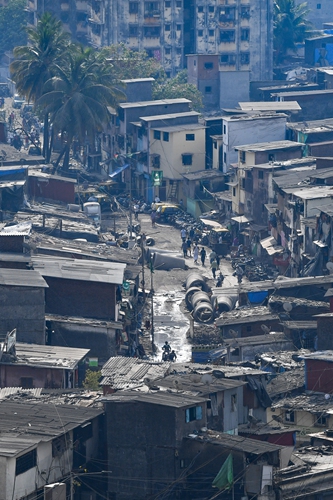Residents light candles and turn on their mobile phone lights outside their home to observe a nine-minute vigil in a show of solidarity in the fight against the coronavirus in Allahabad, India on Sunday. Photos: AFP
“We must defeat the deep darkness of the crisis, by spreading the glory of light in all four directions.”
Modi, who imposed a three-week long nationwide lockdown on March 25, asked all citizens to turn out their lights for nine minutes at 9 pm local time on Sunday, and to display lamps and candles in a show of solidarity.
Modi’s call was met with a huge response, with many people lighting up their balconies. Others lit firecrackers, played musical instruments and sang patriotic songs. Grid data showed India’s national power consumption plunging more than a quarter in a matter of minutes.
The show of unity came as the total number of coronavirus cases in India increased to 3,577, while the death toll rose to 83 on Sunday.
Indian police barricaded parts of one of Asia’s biggest slums on Friday after two coronavirus deaths.
Experts say the coronavirus could spread like wildfire in slums where social distancing and self-isolation are all but impossible.
Two fatalities and a third infection in the Dharavi neighborhood of Mumbai have set alarm bells ringing.
Authorities have set up eight “containment zones” in the area, home to as many as a million people living and working in cramped tin-roofed shanties, flats and small factories – made famous by the 2008 film Slumdog Millionaire.
Some officials have warned that lockdowns could continue beyond April 14 in parts of India where new cases have been detected.
With the number of cases continuing to increase daily, India has restricted the export of most diagnostic testing kits.
The government, which in recent weeks already banned the export of certain medicines, along with ventilators, masks and other protective gear needed by both patients and medical staff, issued the latest directive late on Saturday.
The move came even as US President Donald Trump urged Modi in a phone call to release supplies of anti-malaria drug hydroxychloroquine, which is being tested as a possible treatment for patients with COVID-19, the disease caused by the novel coronavirus.
“The two leaders agreed to remain in touch on the issue of global supply chains for critical pharmaceuticals and medical supplies and to ensure they continue to function as smoothly as possible during the global health crisis,” White House spokesman Judd Deere said on Saturday.
In a briefing note on the conversation, India said the two leaders “agreed to deploy the full strength of the India-US partnership to resolutely and effectively combat COVID-19.”

‘Only God can save us’
Meanwhile, the imposition of the nationwide lockdown on India’s 1.3 billion people has been far from smooth.
Tens of millions of migrant workers were suddenly left jobless when the economy ground to a halt.
Around half a million are thought to have attempted to travel back to their home villages, many on foot.
Some have been crammed onto government buses and relief camps with little regard to infection risks.
Police have been criticized for using heavy-handed tactics to enforce the lockdown, including by the UN rights office.
Footage shared online of a group of migrants being hosed down with chemicals provoked outrage.
There have been local media reports of considerable disruption to the transport of food.
Farmers are worried they will be unable to harvest their crops because of a lack of manpower.
Healthcare workers have complained of shortages and poor quality of protective equipment.
Testing rates in India are lower compared to many other countries, raising doubts about the official numbers infected.
The authorities have appealed to employers to pay wages and landlords not to evict people. The Delhi city government alone is feeding around 400,000 people.
“In spite of all these significant efforts, more needs to be done as the human tragedy continues to unfold before our eyes,” UN Rights Chief Michelle Bachelet said on Thursday.
Resident Mobinuddin Shaikh, 51, whose home is opposite from where one of the patients lived, said people had been largely ignoring India’s 21-day lockdown imposed on March 25, but they were now panicking.
“We are a family of five,” he told AFP by phone. “We use communal toilets or have to get water from public taps.”
“Only God can save us,” he said.


